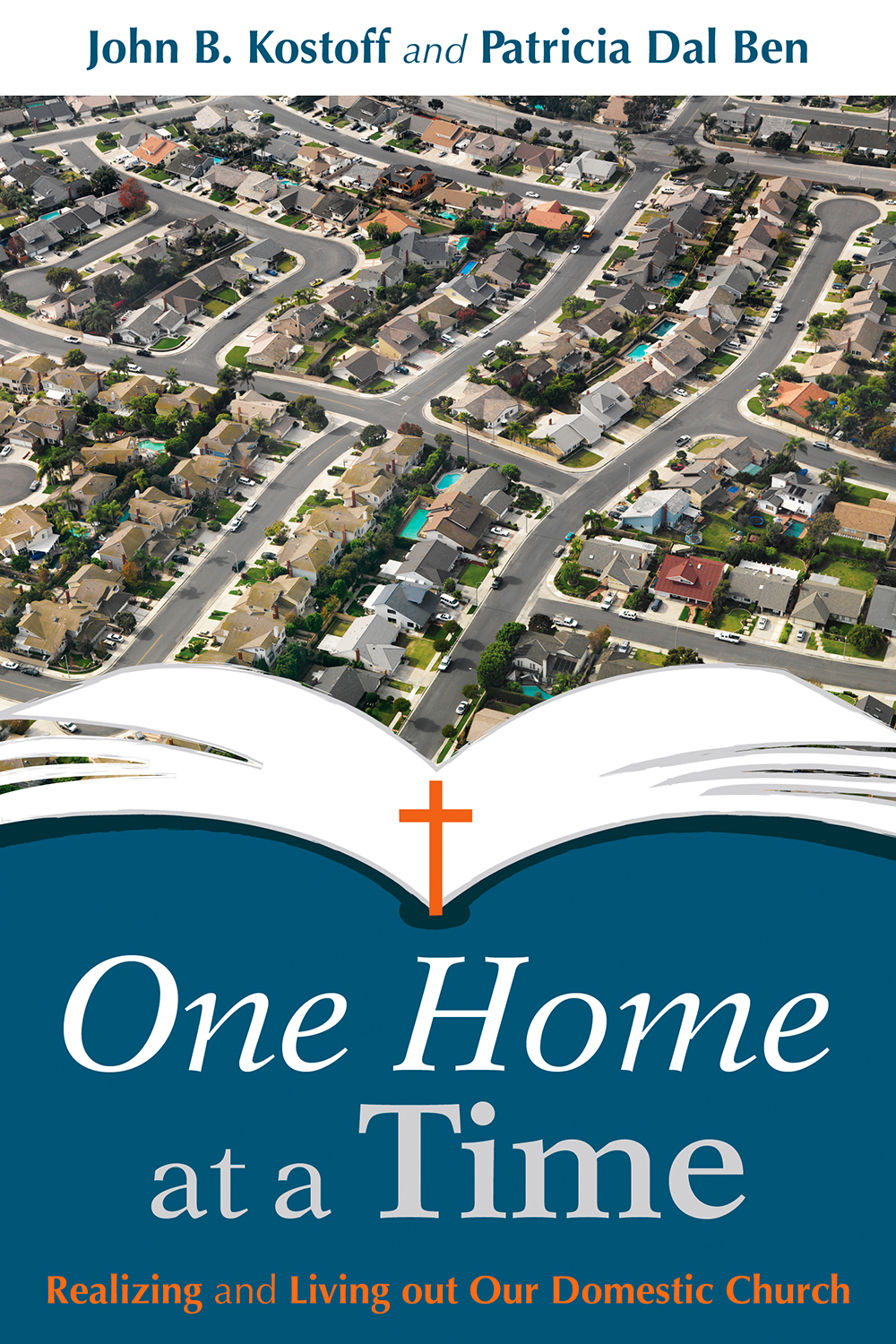
AUTHORS INTERVIEW: ONE HOME AT A TIME

What is One Home at a Time about?
We wrote this book, to invite families to see themselves in a deeper way. It is often said, sometimes glibly, but none the less, “Change the way you think and you change the way you act.” For us, we wanted families to see an ecclesiological aspect to their family and the practices of their family. The Domestic Church is a deeply rooted concept in our faith, that reminds us that our families, our homes, have an essential role in the maintaining of our faith and in the celebrating and in finding new ways to live out that faith into current culture. We spend so much time and energy working with Church renewal, curriculum development, and the improving of the culture of our Catholic schools, that we have only now begun to realize we need to be more attentive to assisting families. Our book is meant to be a means to have families reflect on the nature of being a Catholic family, and find ways to integrate our faith into our daily lives in small but often significant ways.
The true strength of our faith, when challenged is to see it lived out in our kitchens, sports and dance venues, senior homes. If we take seriously that parents are the first educators in the development of their family’s faith, then we have an obligation to support them in this task. That is why we wrote the book, and that is the feedback that is coming back to us, “Thank you for your help. This book has made a difference in our family and faith.” For this we are grateful, to be able to help families in these often challenging times.
What has inspired you to write this book?
Both of us have come from a Catholic educational setting and we have worked with parishes, schools and homes extensively, so we bring that experience when we look at issues of faith.
For me (John), one of the primary motivations to write this book, was watching my sons and their wives go through the Marriage Preparation and RCIA program. These were outstanding programs, but it was important for them to realize that they were beginning not just a life together, but ultimately, they were developing their own “little church” or domestic church.
As we note in our book, Bishop Fiordelli argued passionately at the Second Vatican Council for an expanded theology of family and marriage to include this notion of the ecclesia domestica as a foundational element and gift to the Universal church.
Over our years of experience, no one has ever suggested that we needed to assist parents more. If we want to have our church, school and community families go deeper into the faith, then we have to provide them occasions and events that will assist them on this journey, opportunities for their own faith formation. You cannot expect families of today to fully appreciate the role of the domestic church without giving them the tools to do so. With the very complex times today’s families find themselves in, they need support, examples, people to journey with them; that is what our book has been about. In-servicing often occurs for teachers and administrators but rarely do we assist parents in developing faith-filled home environments and provide them with the skills and the context for deepening their own family’s faith.
We both grew up in regular homes that had the bumps and grinds of daily life, but faith was an important aspect to each of our families. We see our communities as a series of little churches living out daily what we celebrate on Sunday in our parishes. We also take very seriously the baptismal wording that calls each of us to be priest, prophet and king. So, we wanted to write a book that helped parents, widowers, those divorced, separated and those living in blended families an opportunity to reflect on what it means not only to be individuals and not only to be a family but more poignantly what it means be Church in the context of family. The same liturgical seasons that run though our parishes should run through our homes. The stories we hear on Sunday should be heard at home and all of this should change how we project ourselves in the world and for the world beyond the doors of our church and homes.
What goals did you have for this book?
Primarily we would like to see the book used in parish settings with RCIA candidates, those in Marriage preparation, families preparing for Baptism or the many Sacraments we celebrate. We also want to show ways in which schools and parishes could support the domestic church throughout the year. The book is meant to affirm the joyous and hard work of families and give family members an understanding that their families are churches that are called to celebrate, pray, reflect and act on the Good News. We were both struck by the words of St. John Paul II who, reflecting on the Communist times in Poland, said that if it wasn’t for families during those times, the Catholic faith might have been lost for many. For us it means that in our culture we have to emphasize, reimagine and assist parents with developing and sustaining the faith in their families. So much of our energy over the last number of decades has been in service to our Church and the Catholic education system in which we have participated in that we both felt that we had left families out of that equation as an essential part of the renewal process and New Evangelization.
What has been the greatest reward in writing this book?
The comments and emails we have received from teachers, parents and priests saying that the book has been a blue print for their own family has been most rewarding. People have shared how they have created their own domestic church mission statements and have begun to reflect on what matters most in their homes and faith life. Many told us this book had helped them to personally reassess how they were projecting in the world and that using the book helped realign what it means to be a Christian family in the twenty-first century. It is a privileged position to be in, to know that families are using the book, parishes are using the book to reflect on how to be domestic churches. During the recent Advent, we had many comments come to us on how this book helped make Advent a deeper and richer faith experience. To know that we helped families in this way was most certainly a privilege and an honour.
What have been the greatest challenges?
Living up to our own advice in our own families and circle of friends, “Physician, heal thy self” often came ringing in our ears. Beyond that, working with groups, parishes, and school boards that realize the ever-present demands on families and being cautious about adding one more thing to their plate. This should not be an excuse for withholding resources, experiences and opportunities to become more deeply rooted in our faith as a reflective and collective family. We have to believe that those committed to the faith tradition, those who register at Catholic schools, attend mass, donate and volunteer at the local soup kitchen, are trying their best to model what a true church should be not only in the public square but also in their apartments, houses, condos or senior residences.
Final Words?
The concept of the domestic church is a rich river of thought that runs through the landscape of our faith. It is found in the Old and New Testament, in the writings of saints and mystics, in Church documents and in recent letters by St. John Paul II, Pope Benedict XVI and Pope Francis. All of these resources and the people who wrote them, saw the importance and the power that families have in sustaining, supporting, encouraging and celebrating our faith. It is in our families that we welcome the disenfranchised, those lost, the confused, the worried, the anxious and those struggling to make a life for others. It is in our families that we collectively remind ourselves, we are all in this together. If we want a revolution of love, then it must begin with ourselves and then be lived out in our families and cascade throughout our churches and into society; Small steps on a long but rewarding and worthwhile road. We hope that, our book, will continue to support parents, let them know that they are doing a good job, and if they have any extra time, then they might want to try this or that, read our book or perhaps get some new ideas or even share some new ideas. We would also hope that schools and parishes, school councils, parish workshops or through the RCIA and Marriage and Baptism preparation programs and parish associations that they would see One Home at a Time as an essential part of their call and mission to support families at all stages of life. We are all called to help out families become the authentic domestic churches they are christened to be, in our community and beyond, rooted in our Catholic family.
One Home at a Time: Realizing and Living out Our Domestic Church can be found and purchased here.
John Kostoff has worked in the field of education as a teacher and administrator at the elementary, secondary and university level for more than 42 years. John is a frequent contributor to religious education and educational journals. He is executive director of the Ontario Catholic Supervisory Officers’ Association of Ontario.
Patricia Dal Ben has been an educator for more than 30 years, at the elementary, secondary and board level, teaching special education, the arts and religious studies. Currently, Patricia serves as a Religious Education, Faith Formation and Arts Consultant (K-12) for a Catholic school board.


